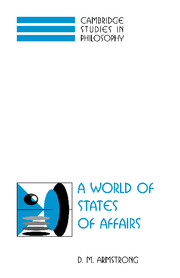Book contents
- Frontmatter
- Contents
- Preface
- 1 Introduction
- 2 Some preliminary doctrines
- 3 Properties I
- 4 Properties II
- 5 Powers and dispositions
- 6 Relations
- 7 Particulars
- 8 States of affairs
- 9 Independence
- 10 Modality
- 11 Number
- 12 Classes
- 13 Totality states of affairs
- 14 Singular causation
- 15 Laws I
- 16 Laws II
- 17 The unity of the world
- References
- Index
10 - Modality
Published online by Cambridge University Press: 03 February 2010
- Frontmatter
- Contents
- Preface
- 1 Introduction
- 2 Some preliminary doctrines
- 3 Properties I
- 4 Properties II
- 5 Powers and dispositions
- 6 Relations
- 7 Particulars
- 8 States of affairs
- 9 Independence
- 10 Modality
- 11 Number
- 12 Classes
- 13 Totality states of affairs
- 14 Singular causation
- 15 Laws I
- 16 Laws II
- 17 The unity of the world
- References
- Index
Summary
TRUTHMAKERS FOR MODAL TRUTHS.
Knowledge that p entails belief that p, but belief that p does not entail knowledge that p. Raising the arm entails that the arm goes up, but the arm's going up does not entail that the arm was raised. In the same way, what is actual is possible, but what is possible need not be actual. As a result, just as we ask what must be added to belief to yield knowledge and what must be added to the arm's going up to yield raising the arm, so we are tempted to ask what must be added to something merely possible to yield its actuality. The parallel, however, is a dangerous one. You cannot add something to what is not there in the first place. So to pursue the parallel with knowledge and the will is to grant some ontological status to the merely possible.
Such a status is, indeed, compatible with a metaphysics of states of affairs. For one could argue that there are two sorts of states of affairs: the actual ones and those that are merely possible. The latter, one could say, have some form of reality. As a matter of fact, a recent interpreter of the Tractatus, the pioneer Factualist metaphysic, interprets Wittgenstein in just this way (Bradley, 1992). There would then lie open a choice between the path of Leibniz and the path of David Lewis.
- Type
- Chapter
- Information
- A World of States of Affairs , pp. 148 - 174Publisher: Cambridge University PressPrint publication year: 1997



